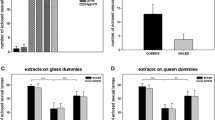Abstract
To optimally allocate resources between workers, reproductive females, and males, ant workers have to be able to identify the sex of larvae and raise them differently. The ability of workers to discriminate between the sexes in the brood was tested in colonies of queenless ponerine ants, Diacamma sp., from Japan. The ratio of male eggs in the egg pile was increased experimentally. This manipulation resulted in a corresponding increase in the ratio of adult males, suggesting that Diacamma workers do not raise the sexes differently.
Similar content being viewed by others
Author information
Authors and Affiliations
Additional information
Received: 4 November 1997 / Accepted after revision: 14 March 1998
Rights and permissions
About this article
Cite this article
Nakata, K. Absence of sex-differential brood raising by workers in Diacamma sp. from Japan. Behav Ecol Sociobiol 43, 223–227 (1998). https://doi.org/10.1007/s002650050486
Issue Date:
DOI: https://doi.org/10.1007/s002650050486




